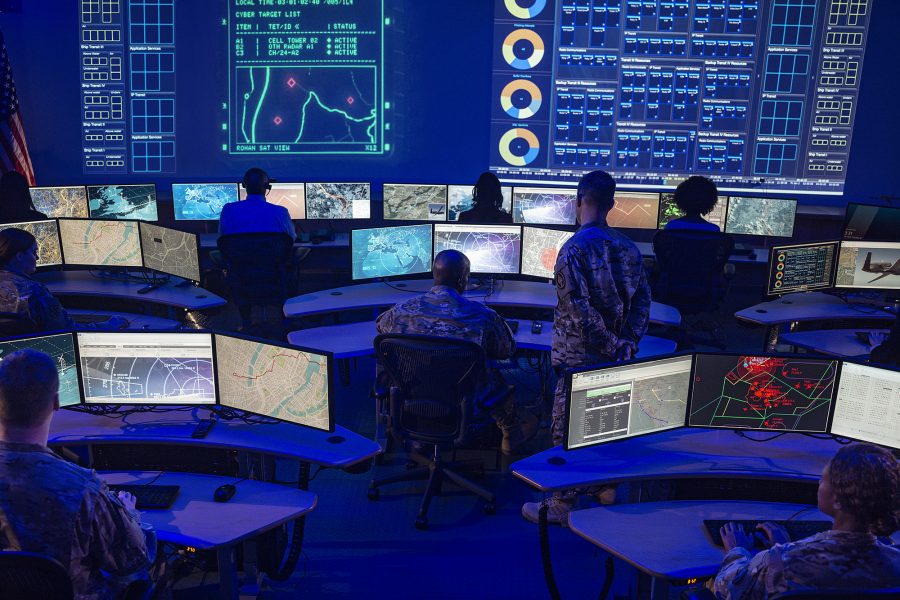Strong performance in space systems helped Northrop Grumman achieve sales three percent higher than a year ago, company officers reported in a July 29 second-quarter earnings call with reporters. CEO Kathy Warden said the company’s prospects are rosy given strong support in Congress for not only a higher defense spending plan than the one requested, but also for Northrop Grumman’s programs, specifically.
Warden said Congress has endorsed the Ground-Based Strategic Deterrent (GBSD) missile system, the B-21 bomber, the F-35 fighter, and the Navy’s Triton unmanned reconnaissance aircraft based on the RQ-4 Global Hawk. She expects an “integrated” new National Defense Strategy and Nuclear Posture Review “in the next six months or so” and is “pleased” that the Biden administration is reviewing both documents in tandem.
“It is the threat environment that should define the overall defense strategy and the role of the strategic deterrent,” she said, responding to how she sees the environment for the company’s strategic programs shaping up.
The administration has clearly stated that Russia is the pacing threat when it comes to nuclear capabilities, but China’s are rapidly growing, making the programs necessary, she said. “Recent intelligence … further supports that,” she added. The NPR will evaluate how well U.S. strategic systems “measure up against that threat.”
Given the assessment and the “affordability of the programs,” Warden said Northrop Grumman has “positioned our portfolio well” and that it “should line up” with the NDS and NPR.
She noted that the Senate Armed Services Committee endorsed a $25 billion increase over the requested $715 billion top line.
“We are making great progress on the GBSD program,” Warden said. “In the second quarter, the team officially closed out the EMD [engineering and manufacturing development] baseline review with our Air Force customer, and we completed the integrated baseline review,” which is a “critical step in setting cost and schedule baselines,” she said, calling it “an important milestone for the program.” The company also recently got a contract to continue supporting the Air Force’s 400 Minuteman III missiles until the GBSD is ready for service.
Warden highlighted Northrop Grumman’s role in the recent Northern Edge wargame, touting the company’s efforts in networking and connecting systems to be able to talk to each other toward a future joint all-domain command and control (JADC2) architecture. Responding to a question, she said she anticipates that JADC2 will be a large federated system of many contractors and platforms, rather than a “big bang” contract with a single company, at some point in the future.
She also noted that Northop Grumman is working on “several restricted programs,” which are apparently above and beyond the B-21 bomber. Chief Financial Officer David Keffer said, “Volume was higher on restricted programs and E-2D,” the Navy’s airborne warning and control airplane, and there was “lower volume in autonomous systems,” which include the Global Hawk and Triton.
Warden did not discuss the B-21, except to refer reporters to the Air Force’s recently released fact sheet and artist’s concept of the bomber, and to tout the program as performing well.
Aeronautics sales were “flat for the quarter,” Keffer said, as several programs, such as the F/A-18 and F-35, are entering a “plateau” of work. As provider of the rear fuselage of the F-35, Northrop Grumman’s work levels run ahead of those at prime manufacturer Lockheed Martin, Keffer pointed out.
Space systems drove Northrop Grumman’s high performance, with sales growing 34 percent in the second quarter and 32 percent year-to-date, “reflecting continued ramp-up on GBSD and the Next-Generation Interceptor,” Keffer reported, as well as the Habitation and Logistics Outpost (HALO) module for NASA’s Gateway space station that will orbit the moon, plus work on NASA’s Space Launch System rocket and the Pentagon’s Next-Generation Overhead Persistent Infrared system (OPIR). Northrop Grumman is also partnered with Blue Origin on designing a human-rated moon lander spacecraft for the Artemis program—a lost bid that Blue Origin founder Jeff Bezos is still trying to get the contract for.
Warden said HALO is one of the company’s very few firm-fixed-price contracts, which the company went into because it already has built similar hardware for NASA and the risk was low. The company has demonstrated that “we will walk away” from a competition if the financial risk is too great, she said. She doesn’t see more fixed-price contracts on the horizon and said the practice may even be on the wane for the industry at large.
